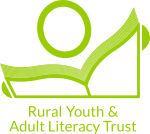I’m on a journey to understanding Dyslexia.
Before joining the Rural Youth and Adult Literacy Trust, I knew very little about Dyslexia and Neurodiversity. However, it would be fair to say my knowledge has grown a little, and I am undertaking more research.
So firstly, please don’t read this article that the writer is an expert; I am merely putting some thoughts down on paper, hoping that you as a reader will want to learn more about Dyslexia!
Dyslexia definition
There appear to be many definitions. However, the definition that I am taking on board is ‘Dyslexia is various reading disorders associated with difficulty decoding written language and integrating auditory and visual information, such as the association of phonemes with letter combinations in spelling.’
Dyslexia is on a continuum
Dyslexia is on a continuum meaning that people have different levels of dyslexia, from mild right through to severe levels. It is also often hereditary and is not caused by a lack of intelligence. People with dyslexia have average to above-average intelligence. And is not driven by poor schooling or family life or a desire not to learn and is not a learning disability. Dyslexic people learn in different ways and continue to learn ongoing.
High-profile dyslexic people
There are many high-profile dyslexic people, including Whoopi Goldberg, Elon Musk and Richard Branson (Barbour, 2020). Branson credits being dyslexic as the secret to his success (Killelea, 2022). He states in the article that being dyslexic has helped him think outside the box. Branson also said in the past that the business world gets too caught up in facts and figures, whereas his dyslexia has helped him “think big but keep the messages simple.”
Dyslexia was officially recognised in New Zealand in 2007.
COVID has been tough on children
COVID and lockdowns have been tough on children and their reading and learning. Schools have been under immense pressure, as have all areas within New Zealand society, as we attempt to recover from COVID but still have the presence around us all.
Teachers are noticing students struggling with general literacy abilities and are becoming concerned. Consequently, the concern is growing as schools and parents see students, sons and daughters having learning difficulties and generally struggling, starting with a history of missing schooling or disengaging with schools that do not meet their needs with traditional education practices and struggling to add the extra wrap-around support that some students are now requiring.
In a small number of schools, the Rural Youth and Adult Literacy Trust (RYALT) has provided invaluable training to teacher aides around dyslexia and phonics and supplied helpful resources to teach students with low literacy. Chrissie Wardle, RYALT’s Coach Student coordinator states, ‘supplying training to teacher aides and resources are the two areas we need to focus on if we are to improve literacy standards in NZ. If more people know the best strategies to teach reading and writing, the more we will tackle low literacy.’
About 100,000 school children have dyslexia or neurodiversity conditions (Styles, 2022). Neurodiversity is used to describe brains that behave, learn, or process differently from typical situations, including ADHD, Autism, Tourette’s, and Dyslexia.
Success can come to us all, as it did to Richard Branson and high-profile people like Whoopi Goldberg and Elon Musk.
The Rural Youth and Adult Literacy Trust is a dyslexic friendly organisation. If your teen is struggling with reading and writing, talk to us today.
If you enjoyed Understanding Dyslexia, we have plenty more reading here. You need to pick a subject.
References:
Barbour, H. (2020, June 2020). Famous People with Dyslexia [A List of 200+ Actors, Athletes, Musicians & Scientists]. Retrieved from blog.ongig.com: https://blog.ongig.com/diversity-and-inclusion/famous-people-with-dyslexia/
Killelea, A. (2022, April 1). Dyslexia is the secret to my success, says Sir Richard Branson. Retrieved from Yahoo News: https://nz.news.yahoo.com/dyslexia-secret-to-success-sir-richard-branson-153019430.html
Styles, M. (2022, January 3). NZ schools are failing dyslexic kids. Parents should consider US-style class action. Retrieved from Stuff: https://www.stuff.co.nz/national/education/127290528/nz-schools-are-failing-dyslexic-kids-parents-should-consider-usstyle-class-action



